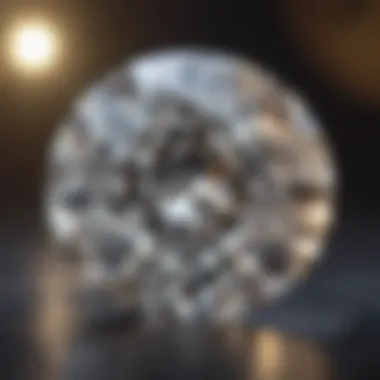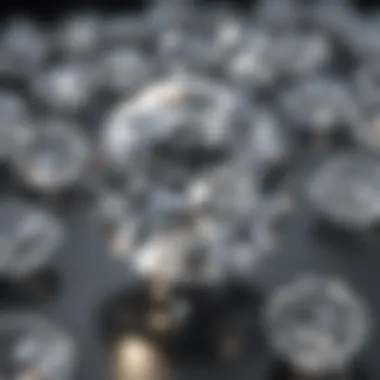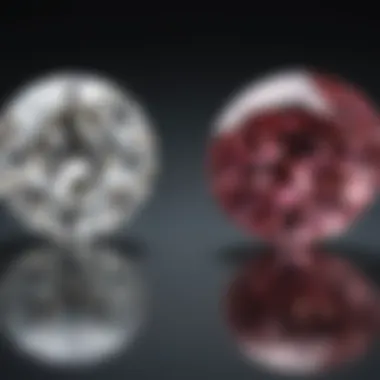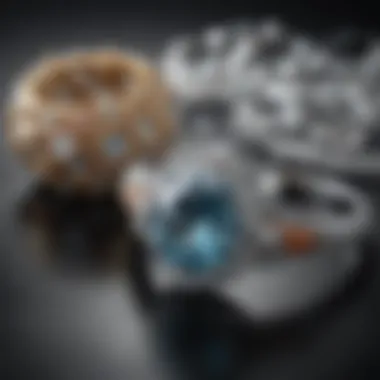Unveiling the Distinctions: Moissanite vs. Cubic Zirconia


Overview of Moissanite and Cubic Zirconia
Moissanite and cubic zirconia are captivating gemstones that have emerged as popular choices for individuals seeking alternatives to traditional diamonds. The allure of these gemstones lies in their unique properties, composition, brilliance, and affordability. Understanding the distinctions between moissanite and cubic zirconia is crucial for those navigating the world of gemstones. By exploring their formation process, defining properties, and value factors, one can make an informed decision when choosing jewelry pieces.
Gemstone Formation and Properties
The creation of moissanite and cubic zirconia involves intricate processes that result in their distinct characteristics. Moissanite, a naturally occurring mineral, is manufactured in laboratories for commercial use due to its scarcity in nature. In contrast, cubic zirconia is a synthesized gemstone produced through a meticulous fusion of zirconium oxide and stabilizers. These gemstones exhibit varying properties such as color, hardness, and luster, which contribute to their overall appeal and durability.
Types of Gemstones
Within the realm of gemstones, moissanite and cubic zirconia fall into the category of simulated diamonds, offering an alternative to costly precious gemstones. While moissanite is considered a high-quality gemstone with exceptional brilliance and fire, cubic zirconia is valued for its affordability and resemblance to diamonds. Exploring the distinctions between precious and semi-precious gemstones sheds light on the diverse range of options available, each with its own unique charm and significance in the world of jewelry.
Identifying and Evaluating Gemstones
Assessing the value and quality of moissanite and cubic zirconia involves considering various factors such as cut, clarity, and carat weight. Techniques for gemstone identification play a crucial role in distinguishing between these gemstones and their natural diamond counterparts. By understanding the intricate details that impact gemstone evaluations, individuals can make informed decisions when purchasing or designing jewelry pieces featuring moissanite or cubic zirconia.
Caring for Gemstones
Proper care and maintenance are essential for preserving the beauty and longevity of moissanite and cubic zirconia jewelry. Cleaning techniques and storage precautions help prevent damage and maintain the gemstones' brilliance over time. Additionally, knowing how to avoid common mistakes in gemstone care ensures that these precious stones retain their radiance and appeal for years to come.
Introduction
This article is a detailed exploration of the gemstones moissanite and cubic zirconia, presenting a thorough comparison between the two popular diamond alternatives. By delving into their composition, brilliance, durability, and value, readers can discern the unique features of each gemstone and make an informed decision regarding their jewelry preferences.
Overview of Moissanite and Cubic Zirconia
Origins of Moissanite
Moissanite, originally discovered in meteorites, is a crystalline form of silicon carbide with exceptional brilliance and fire. Its rarity and beautiful origins make it an intriguing choice for those seeking a unique gemstone with extraordinary optical properties. Although not as widespread as cubic zirconia, moissanite's distinctive origin story adds to its allure, making it a compelling option for jewelry connoisseurs.
Origins of Cubic Zirconia


Cubic zirconia, synthesized in labs for over 50 years, boasts high clarity and remarkable similarity to diamonds. Its affordability and versatility have made it a popular choice in the jewelry industry, offering a brilliant alternative to traditional gemstones. Despite its synthetic genesis, cubic zirconia's ability to mimic the sparkle of diamonds effectively has established it as a preferred option for budget-conscious consumers.
Popularity in the Jewelry Industry
Both moissanite and cubic zirconia have carved a niche in the jewelry market due to their unique characteristics. Moissanite's growing popularity among eco-conscious buyers seeking ethically sourced gemstones has positioned it as a sustainable alternative to traditional diamonds. On the other hand, cubic zirconia's widespread acceptance in the fashion industry reflects its affordability and accessibility, making it a versatile choice for a broad range of jewelry designs.
Objective of Comparison
Understanding Key Differences
A critical aspect of this comparison is to highlight the nuanced differences between moissanite and cubic zirconia, providing readers with essential information to distinguish between the two gemstones effectively. By understanding their distinct compositions and properties, individuals can make informed decisions based on their preferences and requirements, ensuring they select the gemstone that aligns with their desired characteristics.
Highlighting Unique Characteristics
In emphasizing the unique features of moissanite and cubic zirconia, this comparison seeks to showcase the individual allure of each gemstone. Whether it is moissanite's extraordinary dispersion levels and high refractive index or cubic zirconia's remarkable durability and consistent brilliance, readers will gain insights into the distinguishable qualities that set these gemstones apart. By showcasing their exceptional characteristics, this comparison aims to assist readers in appreciating the distinct beauty and value offered by moissanite and cubic zirconia in the realm of jewelry.
Composition
In this intricate exploration of Moissanite and Cubic Zirconia, understanding the composition of these gemstones is fundamental. Composition forms the bedrock of their properties, determining their brilliance, durability, and overall value. The chemical makeup of Moissanite and Cubic Zirconia sets them apart, each with unique characteristics that appeal to different audiences in the gemstone world. Dive deep into this section to unravel the elemental secrets behind these fascinating diamond alternatives.
Chemical Makeup of Moissanite
Moissanite's allure lies in its Silicon Carbide structure, a defining feature responsible for its exceptional brilliance and fire. This structure showcases remarkable optical properties, displaying dazzling dispersion levels and a high refractive index that rival even the finest diamonds. The robustness and resilience of Silicon Carbide make Moissanite an attractive choice for jewelry enthusiasts seeking a gemstone that sparkles with unparalleled radiance. However, the Trace Elements Impact on Moissanite's composition cannot be overlooked. These trace elements influence its overall appearance and play a crucial role in determining its uniqueness. Understanding how these elements interact within the crystal lattice of Moissanite enhances our appreciation of its distinct beauty and allure, making it a sought-after gemstone in the jewelry industry.
Composition of Cubic Zirconia
On the other hand, Cubic Zirconia boasts a composition predominantly consisting of Zirconium Dioxide. This robust structure grants Cubic Zirconia its signature clarity and color, mimicking the brilliance of high-quality diamonds. The Zirconium Dioxide structure serves as the foundation for Cubic Zirconia's affordability and versatility in jewelry design, offering a cost-effective option without compromising on aesthetic appeal. Moreover, the Doping Process involved in Cubic Zirconia's production further enhances its visual properties, allowing for a spectrum of color variations to suit diverse preferences. By delving into the composition of Cubic Zirconia, we unravel the artistry behind its creation and understand why it continues to captivate gemstone enthusiasts seeking elegance at a fraction of the cost.
Physical Attributes
Physical attributes play a crucial role in the comparison between moissanite and cubic zirconia. Understanding the brilliance, fire, hardness, and wear resistance of these gemstones is essential for consumers looking to make an informed choice for their jewelry preferences.


Brilliance and Fire
Brilliance and fire are key factors that differentiate moissanite and cubic zirconia.
Dispersion Levels
Dispersion levels refer to the gemstone's ability to split light into spectral colors. In this comparison, moissanite is known for its high dispersion, creating vivid flashes of color that enhance its brilliance. On the other hand, cubic zirconia boasts impressive dispersion levels, offering a fire that rivals even some diamonds. The unique feature of dispersion levels lies in the play of light within the gemstone, adding a captivating allure to both moissanite and cubic zirconia. While moissanite excels in fire, cubic zirconia's dispersion levels contribute to its brilliance, making them excellent choices for jewelry aficionados.
Refractive Index
Refractive index influences how light travels through a gemstone. Moissanite showcases a high refractive index, giving it a radiant sparkle and exceptional brilliance. Conversely, cubic zirconia's refractive index also contributes to its dazzling appearance, reflecting light beautifully and mimicking the visual characteristics of high-quality diamonds. The distinct feature of refractive index enhances the overall allure of moissanite and cubic zirconia, highlighting their unique visual appeal. Both gemstones offer advantages in terms of sparkle and radiance, appealing to those seeking ethereal beauty in their jewelry pieces.
Hardness and Durability
Considering the hardness and durability of moissanite and cubic zirconia is paramount when selecting gemstones for jewelry pieces.
Mohs Scale Comparison
The Mohs scale compares the hardness of different minerals, with moissanite scoring higher than cubic zirconia. Moissanite's impressive hardness makes it resilient to scratches and abrasions, ensuring longevity in jewelry settings. On the contrary, cubic zirconia, while durable, is slightly softer than moissanite, requiring gentle care to maintain its luster. The unique feature of Mohs scale comparison lies in determining the gemstone's ability to withstand daily wear and tear, making moissanite a preferred choice for those seeking enduring elegance in their jewelry collections.
Wear Resistance
Wear resistance measures how well a gemstone can withstand abrasion and damage due to regular wear. Moissanite exhibits excellent wear resistance, remaining unaffected by everyday activities and maintaining its brilliance over time. Cubic zirconia, although durable, may experience slight wear over prolonged use, necessitating periodic cleaning and maintenance. The distinctive feature of wear resistance emphasizes the practicality of moissanite in jewelry, offering enthusiasts a gemstone that combines beauty with durability for long-lasting wearability.
Aesthetics and Value
When it comes to exploring the realm of moissanite and cubic zirconia, delving into the intricacies of aesthetics and value is imperative. Aesthetics encompass the visual appeal and beauty of these gemstones, drawing enthusiasts, collectors, and designers towards their alluring charm. The value aspect goes beyond monetary worth, delving into the inherent qualities and distinct features that define their desirability in the jewelry market. Understanding the nuances of aesthetics and value plays a pivotal role in making an informed choice between moissanite and cubic zirconia for varied jewelry preferences.
Color Variations
Natural Color Options


Natural color options in moissanite and cubic zirconia hold a significant sway over jewelry aficionados due to their genuine and unaltered hues. The authenticity of these natural color options adds a touch of uniqueness to each gemstone, appealing to discerning eyes seeking exclusivity. While moissanite boasts a natural color spectrum, cubic zirconia displays its own array of unenhanced colors, providing versatility in design choices. Embracing these natural color options introduces a touch of individuality and sophistication to jewelry pieces, elevating their aesthetic appeal.
Enhanced Color Treatments
The world of gemstones witnesses an infusion of enhanced color treatments, enhancing the vibrancy and allure of moissanite and cubic zirconia. These treatments offer a wider range of hues and shades, catering to diverse preferences and design trends in the jewelry industry. Enhanced color treatments bring a modern twist to traditional gemstones, allowing for customization and creativity in jewelry crafting. While these treatments introduce a kaleidoscope of colors, they also raise considerations regarding long-term color stability and authenticity, urging consumers to weigh the advantages and potential drawbacks of opting for enhanced color-treated gemstones.
Cost Considerations
Pricing Factors
Examining the pricing factors associated with moissanite and cubic zirconia sheds light on the economic aspect of these gemstones. Factors such as rarity, demand, and production costs influence the price points of these stones, determining their accessibility to a wide range of consumers. Understanding the dynamics of pricing factors enables buyers to make informed decisions based on budget constraints and desired quality standards, ensuring a harmonious balance between affordability and value.
Long-Term Investment Potential
Delving deeper into the long-term investment potential of moissanite and cubic zirconia unveils their durability and resilience, factors that contribute to their lasting appeal. While these gemstones offer cost-effective alternatives to diamonds, their longevity and enduring beauty position them as viable investment options in the jewelry market. The enduring nature of moissanite and cubic zirconia makes them attractive choices for individuals seeking timeless and valuable additions to their jewelry collection, blending aesthetic allure with long-term investment prospects.
Comparison in Jewelry
In this detailed exploration of Moissanite and Cubic Zirconia, the comparison in jewelry holds significant importance for gemstone enthusiasts, collectors, and jewelry designers. Understanding the distinctions in how these two stone options fare in jewelry settings offers valuable insights for those seeking alternatives to traditional diamonds. By examining the characteristics that make each gem unique in various jewelry styles, readers can make informed decisions tailored to their preferences and needs.
Setting Preferences
Styles Suited for Each Gemstone
Examining the suitable styles for both Moissanite and Cubic Zirconia is essential in optimizing their visual appeal. Their individual properties lend themselves to specific design aesthetics, with Moissanite often favored for its brilliance and Cubic Zirconia for its fiery display. The adaptability of Moissanite in various cuts and settings enhances its versatility, while Cubic Zirconia's ability to mimic diamonds makes it a popular choice for elegant and classic designs. Understanding the ideal style match for each gem ensures that the chosen jewelry piece truly shines in its intended setting.
Setting Compatibility
The compatibility of gemstones with different settings influences not only the aesthetics but also the longevity of the jewelry piece. Considering factors such as the setting's design, material, and security ensures the gemstone is showcased optimally while remaining secure and protected. Moissanite's durability makes it suitable for a wide range of settings, from simple solitaires to intricate halo designs. On the other hand, Cubic Zirconia's affordability and brilliance make it a versatile option for various setting types, allowing for creative and customizable jewelry pieces. Evaluating the compatibility of each gem with different settings enables individuals to select the most suitable combination that aligns with their personal style and maintenance preferences.
Maintenance and Care
Cleaning Methods
Exploring the appropriate cleaning methods for Moissanite and Cubic Zirconia jewelry is essential to ensure their brilliance and longevity are preserved. Understanding the specific cleaning techniques suitable for each gemstone helps maintain their sparkle and clarity over time. While Moissanite withstands everyday cleaning solutions well, Cubic Zirconia requires gentler care to prevent damage to its surface. Implementing correct cleaning practices tailored to each gemstone type guarantees that the jewelry piece retains its allure and beauty for years to come.
Resilience to Daily Wear
The resilience of Moissanite and Cubic Zirconia to daily wear impacts their practicality as gemstone choices for everyday jewelry. Assessing their ability to withstand routine activities, exposure to elements, and potential impacts guides individuals in selecting a durable and long-lasting option. Moissanite's hardness and resistance to scratching make it a reliable choice for pieces worn regularly, while Cubic Zirconia's robustness against chipping ensures its longevity even with frequent use. Recognizing the level of resilience exhibited by each gemstone aids in making an informed decision on the ideal stone for jewelry that can accompany individuals through their daily adventures.







